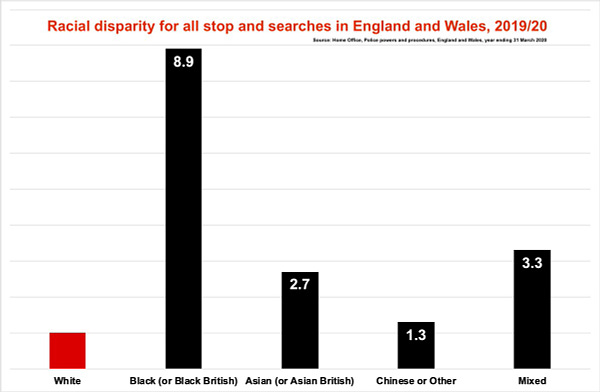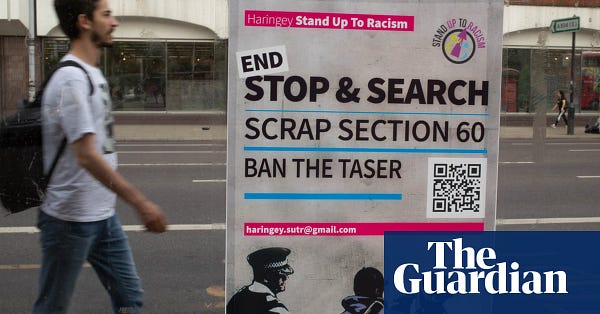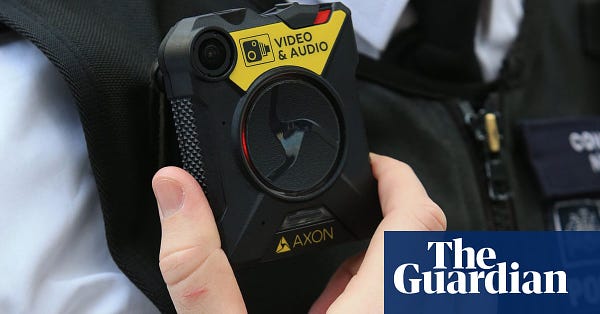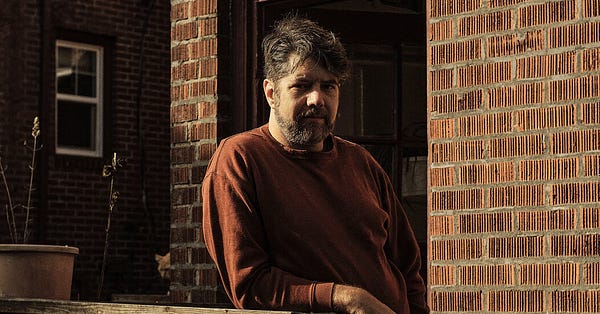October 2020: Every year, the same damn thing
New police powers and procedures data tell us what we already suspected, as does evidence of police practices caught on Body Worn Video cameras
Dear StopWatchers,
The major statistical dataset of the year came as no surprise to us, but at least it did not overshadow the work that we do to raise awareness of unfair and discriminatory policing, most notably an appearance from our chief executive Katrina Ffrench at a Black Tech Fest seminar on biases in artificial intelligence.


Topics in this newsletter include:
Every year, the same damn thing – new police powers and procedures data tell us what we already suspected
Body Worn Video: If seeing is believing, then what is concealing? – a month after the home secretary calls for footage of stops to be made publicly available, the Met decide against it
Police behaving badly – a sample of media reports that captures the utter state of policing in the UK today
In Terrible tech, one activist puts police on the other side of the camera with a new facial recognition app
A bunch of interesting perspectives on policing in other news
Please enjoy our roundup of stories below.
Every year, the same damn thing
As expected, the annual Police powers and procedures release from the Home Office showed a huge rise in the number of stop and searches in the year ending 31 March 2020 – use of the power increased by a half (52%) in England and Wales, from 378,968 in 2018/19 to 577,054 in 2019/20 (its highest level since 2013/14) – while the overall arrest rate declined, from 16% to 13%.
Of the total number of stops and searches in total over the period, three quarters (76%, 437,139) resulted in no further action taken, three percentage points more than in 2018/19 (73%).
Tellingly, despite the well-worn rhetoric about the power as a ‘vital tool’ to rid the streets of knife crime, the figures show the vast majority of searches under the main power (Police and Criminal Evidence Act 1984 (PACE) Section 1) continue to be for drugs (62%), compared with just over a sixth for offensive weapons (16%).
And yet again, stop and search proved to be racially disproportionate against minority ethnic groups (illustrated).


Subsequent reports highlighted the error-strewn ways in which forces like the Met have used stop and search, undermining the tactic’s legitimacy. The Independent Office for Police Conduct (IOPC) made 11 recommendations for the capital city’s force, as part of ‘an embarrassing set of findings for the Met, which has been plagued by claims of racial bias, and whose leadership has dismissed claims that its tactics and approach have been damaging community confidence’ (Guardian, 28 Oct), exemplified by a painful interview on Channel 4 News (below, 27 Oct), in which police commander Jane Connors appeared tone deaf to the grievances aired by youth worker Sayce Holmes-Lewis.
Among the many hot takes attempting to tease out patterns and trends in the data timeseries, Netpol offered the most pithy summary – nothing has changed.


And looking to the future, the chances are that even the global pandemic won’t change this egregious racial disproportionality in time for the next release. 2020 has thrown up all manner of surprises, but if we can be sure of anything, it is that you can add ‘Racial bias in policing’ to Death and Taxes as one of life’s few certainties.
Body Worn Video: If seeing is believing, then what is concealing?
In July, athletes Bianca Williams and Ricardo dos Santos and their three-month-old baby son were subjected to a distressing vehicle stop and search which brought widespread attention to officer behaviour during searches of Black people.
Just three long months later, the Independent Office for Police Conduct (IOPC) announced that five officers were under investigation for potential misconduct (Guardian 08 Oct), at odds with the Directorate of Professional Standards (DPS) claim at the time that there wasn’t even a case to answer on those grounds.


And between having their accusations of racial profiling dismissed and the allegations of gross misconduct trivialised (including the action of adding their baby son to a police database (Independent, 08 Oct), the innocent couple have said they may boycott the investigation into their case altogether, because they are not being taken seriously (Guardian, 09 Oct).
In a statement, dos Santos said:
This investigation has been derailed. After three months we are finally told by the IOPC that the officers are being investigated for lack of courtesy.
Polite racism is still racism. The IOPC have let the Met off the hook….
The officer who dragged me out of the car with a raised baton and handcuffed me, who detained me under section 23 [of the] Misuse of Drugs Act and recorded falsely on my stop and search form that I smelt of cannabis is being investigated for politeness.
How is racism ever going to be tackled in police forces if the police watchdog classify it as a “respect and courtesy” issue rather than an “honesty and integrity” issue. Neither the police or the IOPC seem to take discrimination issues seriously.
One reason why the fallout from the incident still makes the headlines is because they filmed it. Bianca Williams and Ricardo dos Santos are but two of many who have had to film and share their experiences because they did not trust the police to provide their own side of the story. This is despite the police wearing Body Worn Video (BWV) cameras. It seems obvious – even to the home secretary – that an antidote to the gap in trust between the police and the public is to release BWV footage of all incidents.
However, as sure as there was anything approaching consensus, it was short-lived, as the Met Police decided not to release their video footage after all (Guardian, 19 Oct). But whyever not? Does it show civilians for being the untamed, uneducated miscreants we really are?


Of course not. In an internal memo sent on 28 August, deputy assistant commissioner Matthew Horne wrote:
Whilst we have seen some exemplary BWV of interactions with the public, with high levels of skill, patience and professionalism, we have seen many more examples where although the BWV does not show any conduct issues it shows poor communication, a lack of patience, a lack of de-escalation before use of force is introduced and occasionally poor officer safety decisions.
The document also shows that the Met was concerned that releasing body-worn video could make things worse: ‘Release of BWV is highly likely to exacerbate not prevent “trial by social media” and increase media interest in an incident.’ Or in other words, it would no longer be able to control the narrative.
StopWatch chief Katrina Ffrench said: ‘I suspect that if this footage was shown it would illustrate the behaviours that Black communities have been speaking about for generations, which is lack of professionalism, rudeness, excessive use of force.’
Such behaviours lead people to provide their own video footage, which academic Ian Hamilton suggests ‘shows that we have reached a new low where citizens need to be prepared to provide their own evidence of an invasive police action to ensure their version of events is heard’ (Independent, 06 Oct).
Ultimately, Hamilton writes that we need a change in the ‘beliefs and attitudes’ of those commissioning and carrying out the invasive power of stop and search. We may need to film it change to believe it, though.
Police behaving badly
Instances of unfair policing in the public eye seem especially long and egregious this month. In some ways though, they are simply a litany of the day-to-day operations of an institution in dire need of an overhaul.
To summarise, this month alone the police have made the headlines for the following:
the harassment of an innocent civilian repeatedly over decades in the name of stop and search (Birmingham Mail, 03 Oct)
assaults during stop and searches by an officer using excessive force (BBC News Birmingham, 16 Oct)
disrupting peaceful protest, unprovoked (Guardian, 10 Oct)
failing to deal with racist attacks, questioning victims as though they’d done something wrong themselves (Guardian, 21 Oct)
implicitly blaming women and non-binary people for not keeping themselves safe enough in public (Independent, 15 Oct)
showing that they are ill equipped to deal with acute periods of mental health distress (Guardian, 09 Oct; and below)


discharging a lethal weapon on a pregnant woman, causing her to lose her child (Guardian, 21 Oct)
killing with relative impunity, even off-duty –
Q. When’s a murder not a murder? A. When a police officer does it
(Independent, 29 Oct)the ‘continued use’ of tear gas – an unauthorised weapons system – during operations, long after the Home Office advised against it (video below)


breaking the laws they are employed to uphold (MSN, 19 Oct, following on from Kent Online, 24 Sep)
admitting to it #Spycops (Justice Gap, 16 Oct)
thwarting all complaints against their public order policing taskforce for seven years up to 2018 (Guardian, 15 Oct)
recruiting children to meet their employment targets (The Times, 22 Oct £wall)
And yet, it would be easier to draw blood from a stone than an admission from certain top brass that policing practices are inherently discriminatory or wrong in any way (Guardian, 22 Oct).
It’s tiring having to write this. But not as tiring as having to live it. And that’s why we continue to raise awareness, and to campaign for justice.
Terrible tech – identify yourself
One tech savvy activist in Portland has embraced a reciprocal approach to the question of how individuals might achieve true equality before the law: he made his own facial recognition app to identify officers.


However, there still isn’t a technological defence against warrantless searches of mobile phones (The Register, 21 Oct). A report by Upturn has revealed the far-reaching capabilities of mobile device forensic tools (MDFTs), ‘a powerful technology that allows police to extract a full copy of data from a cellphone – all emails, texts, photos, location, app data, and more – which can then be programmatically searched’.
No tech can totally prevent bad policing, but it can at least help provide some justice if in the right hands.
Section 60 watch*
London
Ealing (20, 24 Oct), Hillingdon (19, 24 Oct), Hounslow (20 Oct), Peckham (16 Oct)
Thames Valley Constabulary
Crowthorne and Sandhurst (02 Oct)
* This is not a comprehensive list
Scrap Section 60 bill delayed again
Bill reading and debate in the House of Commons has been delayed to January now. So there is still time to sign and share the petition and let your MP know, especially in light of the Home Office figures that prove how ineffective the power is.
Scrap Section 60.
In other news…
‘Far-right derision and condemnation of police failures can effectively agitate for the police, whose violence is born of racist control, to enact further state surveillance, discipline and brutality against black and brown people and political opponents… Bolstered anew with tough law-and-order talk from government since 2019, policing can only ever go rightwards’, writes organiser Becka Hudson in an article discussing the inherent susceptibility of policing to the demands of fascistic authoritarianism (Novara Media, 07 Oct).
In the United States, cities are facing a growing number of lawsuits alleging excessive force against protesters this year, leading to mounting bills for local authorities, a dilemma considering cities use their residents’ tax revenues to pay for law enforcement activity (Bloomberg, 28 Oct). A helpful reminder to Brits that roughly 30% of police funding here comes from your council tax precept.
In light of news about College of Policing’s involvement in training Nigerian Special Anti-Robbery Squad – a unit notorious for their acts of brutality towards civilians, including synonymous with unlawful killings, torture and extortion (Independent, 30 Oct) – Reece Parkinson and Shahlaa Tahira get the thoughts of an individual involved in the protests to disband them, as part of a series of conversations exploring future possibilities in policing.


If you wish to know where and how you can provide support for the protests, gal-dem have produced an excellent guide (21 Oct).
And lest we forget, there is still a pandemic on, and as long as this is the case, the good folks at Big Brother Watch will be keeping tabs on the charges issued by the police under the Coronavirus Act. Safe to say, in the battle between the police acting legally and the Crown Prosecution Service calling them up on it, the police have still managed to maintain their incredible 100% record.

StopWatch is a volunteer-led organisation that relies on the generosity of trusts and grant funders to operate. We DO NOT accept funding from the government or police as we believe this would compromise our ability to critically challenge.
Details are:
CAF Bank – Registered office: CAF Bank Ltd, 25 Kings Hill Avenue, Kings Hill, West Malling, Kent, ME19 4JQ
Account Name: StopWatch | Sort Code: 40-52-40 | Account Number: 00027415
—
Stay safe,
StopWatch.



